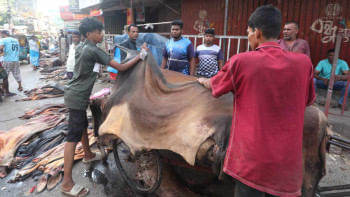Nothing learned, nothing forgotten
After the French Revolution a large number of Bourbon loyalists migrated to other countries to escape the concessionary policies of Louis XVI and the violence of the republicans. When the Bourbons were restored in 1814, these émigrés returned to their country with exactly the same mentality they had left with 25 years earlier. The great statesman and diplomat of that era, Talleyrand, had said of them: "They learned nothing and forgot nothing." This statement was rephrased by an Italian professor recently as "Nothing learned, nothing forgotten" (N-L-N-F). The professor further elaborated N-L-N-F as a class of people who judge today's events with exactly the same criteria as those years ago.
Only six years ago the country was on the brink of a civil upheaval because of intransigence shown by the main political parties at that time in agreeing to a peaceful transition of power overseen by an interim neutral government. The party in power at that time had a grand view that the country had given it authority to rule it for infinity, and all it required was to secure the means to ensure it. So it went about putting in place the mechanisms and retrofitting the institutions that would facilitate a perpetual hold on power.
We are all aware of what happened then. We had intervention by the armed forces to foist on the country a long-enduring caretaker government, the ire of which was borne by the leaders of both the sides that are currently engaged in the political crisis.
Six years down the road we are back to where we started. It seems that two years of army-backed rule, months of detention behind bars of many of the current leaders who are at loggerheads with each other now, and public accusations of venality against many of them have disappeared from the memory of our political leaders like water flowing under a bridge.
As they were six years ago, the political parties and their leaders are impervious to the damage to economy and the sufferings of the people that their actions are causing. They are unmoved and unaffected by the mayhem that their acolytes are launching on the streets; they are not concerned if their actions lead the country down the drain.
In fact, they are threatening that more of such bedlam and anarchy will happen if their demands are not met.
We have the classic group of N-L-N-F people all over again. They have not learned how a crisis created by intransigence of political opponents can bring the entire country to a halt. They never learned how such crisis is a stigma on our reputation in the international community. They also did not learn from the public humiliation a good number of them went through when they fell out favour and out of power. They also did not forget the taste of power as they did not forget what the purse and the privy power brought them.
The looming crisis in the country carries worse forebodings now than six years back as the major opposition party has gone on a warpath supporting issues that defy the spirit of the Liberation War of 1971. And the most ominous part of the looming crisis is the call by the leader of the party to turn the country into a wasteland if the demands of the party are not met.
One wonders if it is really the voice of a person who was twice at the helm of the country. One wonders if this is really the voice which can be won over by reason.
There are serious concerns both at home and abroad about the looming crisis and how it can be averted. Surely, a crisis cannot be averted by slamming the spontaneous rallies of people demanding trial of war criminals as anti-religious and partisan politics. A crisis cannot be averted by having political rallies ostensibly against the government, but in reality to incite people against spontaneous mass movement by labeling it a conspiracy against religion. A crisis cannot be averted by letting political acolytes attack government property, waylay transports, and generally terrorise people. It can be averted only if people who voice such unreasonable thoughts truly understand history, have the ability to reassess their own political beliefs, and relate to all people beyond the narrow confines of their political coterie.
The sadness of the current madness fast developing in the country is that we are really a people dominated by the N-L-N-F class. They dominate both our political parties, and we are held hostage by them. They have not learned that the majority in Bangladesh have long rejected use of religion for political purposes. They have not learned that the majority in Bangladesh are products of a sovereign nation that takes pride in its birth as a Bangali nation. They have not learned that the people of Bangladesh know which leadership can deliver and who they will ultimately trust as leaders.
These leaders may not have forgotten the taste of power and what it brought them. But they will be well served if they realise that rhetoric may incite their acolytes to do their bidding, but this will not bring them to where they want to be. If they truly want to serve the country and its people they need to first respect the people and their wishes. And the people of Bangladesh do no not wish to go back to an ideology that brought down Pakistan. They also do not want a repeat of the experience of 2007.
It may be too much to hope for an easy solution to the impending crisis, such as settling of thorny political differences rationally. As history shows, when these differences assume a daunting proportion and take the country to a precipice the people take over and dictate. We can only hope that we will avert a crisis before the people step in to guide these leaders.
The writer is a former staff member of the World Bank in Washington DC.


 For all latest news, follow The Daily Star's Google News channel.
For all latest news, follow The Daily Star's Google News channel. 



Comments